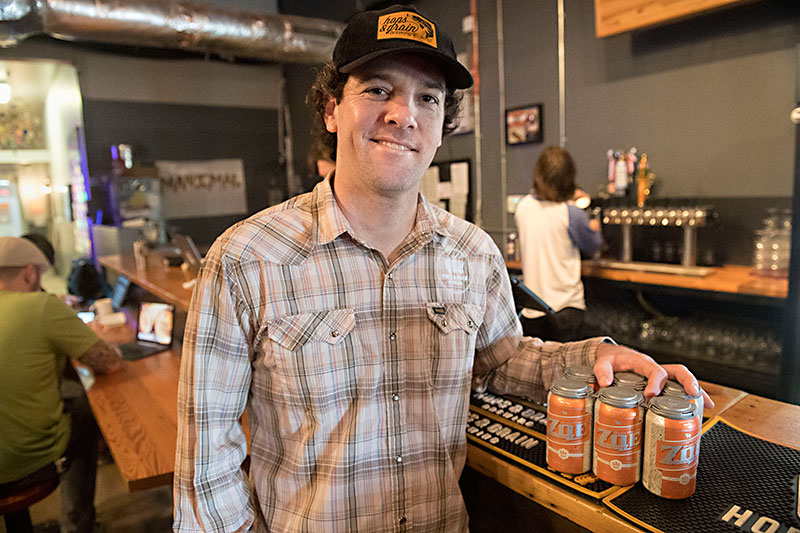The Battle of Small Beer vs. Big Distributors Rages on With Texas Beer-To-Go Bill
Another chippy round of political beer pong
By Eric Puga, Fri., Feb. 1, 2019
Here in Texas, the small, plucky craft brewers and the overdetermined parade of wholesale distributors are, unsurprisingly, back at it again for another chippy round of political beer pong in this, the 2019 Texas Legislature. Only this time, the brewers appear more organized by their industry guild and its political arm, CraftPAC, which sounds like either a sugary pudding from the Nineties or a collection of pissed-off, brass-knuckled beerists ready to take up for small business rights.
For context, this back-and-forth between two of the three branches of Texas' alcohol regulatory system has spluttered for years, with the wholesalers envisioning themselves as Thirties-era post-Prohibition throwbacks, where any guff about their well-funded political overreach might earn you a kick in the face from Tony "The Rotary Tiller" Russo. At least it's how they metaphorically want to operate: massacring basic-level business practices to willfully obstruct the innovation, creativity, and sustainability of the craft brewers who ensure the success of the wholesalers themselves. No matter the era, the focal distributor ethos of, "Hey, it's always just been that way, so it should stay that way," is not a great political argument.
How We Got Here
Anytime a beer story needs someone to play the villain, you bring in the wholesalers. So, we'll start in 2013, when the 83rd Texas Legislature saw the largest overhaul for craft brewery freedoms in state history with Senate Bills 639 and 515-518. Those pieces of legislation legalized everyday, normal beer-culture shit – like brewpubs selling to distributors and retailers (with a capped limit), an increased annual production cap for brewpubs, and approved on-premise beer sales for manufacturing breweries, which helped launch an explosion of new taprooms around the state.
But with those stock-issue beer liberties came a sweetheart deal for the distributors. The new law stipulated that brewpubs and manufacturing breweries could no longer profit off their own territorial distribution rights and would instead be forced to cede their distribution interests over to the wholesalers at no cost. This legal dud would cost millions in up-front revenue for some of the better-established craft breweries in Texas – money that would otherwise have gone to brewery improvements like updating equipment, improving facilities, and, ironically, building out new taprooms.
Even more, the wholesalers were granted exclusive territorial distribution rights to these craft breweries for the life span of the brewery and could even negotiate the brands between other wholesalers for large profits should a brand in their portfolio be deemed more valuable as up-front cash than long-term retail sales. When the bill passed, Texas became the only state with such a law, confirming that even in a cycle with positive small-business reforms for Texas craft breweries, the wholesalers continue to trill their annoyance at an industrial volume.
State Rep. Eddie Rodriguez, D-Austin author of the "beer-to-go" House Bill 672 that is being proposed in 2019, recalls that wholesalers have been lobbying and testifying against beer-to-go bills for over a decade. "They've pushed misleading, anti-craft legislation such as [2017's] HB 3287, [which was] sold to members as a pro-craft bill. HB 3287 served an arbitrary cap on breweries' production capacities and required them to pay a wholesaler for the privilege of selling their [own] beer in their own taprooms if they exceed that cap."
In other words, starting in 2017, if a brewery sold over a certain amount of beer per year, the brewery would have to then sell their beer to a wholesaler only to have to buy it right back for the purposes of selling it in their own taproom. Even if that beer never left brewery property.
Is Yr Permit Lit?
To understand the wonky beer laws in Texas, one must first understand the differences in permits – brewer vs. brewpub – which, based on the awful distinction in names, undoubtedly sets a stage for complication in even the most benign details.
The basics are: If a brewery holds a "brewpub permit" – like Pinthouse Pizza, Oddwood Ales, and Jester King all do – it allows those breweries to make beer on-site, offer it to their in-house customers, and also sell it to-go. Brewpubs are limited to producing 10,000 barrels per year and can self-distribute 1,000 barrels directly to retailers/bars. Not a bad deal at all for Ye Olde Backhair Brewpub.
On the other hand, "brewer's permit" holders – often referred to as "manufacturing" breweries like Austin Beerworks, Live Oak, and Celis – can sell up to 5,000 barrels of beer on-site and have a 225,000-barrel-per-year production cap on what they are able to produce for retail. These breweries have an option to distribute through a middleman wholesaler or self-distribute. However, if a brewery chooses to self-distribute, the annual production cap is revised to 40,000 barrels per year.
But the most glaring difference between a brewpub permit and a brewer's permit is that the manufacturers cannot sell their beer to-go. Not in a growler, not in a crowler, not as a sour, not for the shower. No beer to-go. Not at any hour.
And yet, the process of switching over from a brewer's permit to a brewpub permit – the primary solution wholesalers have offered for the "to-go beer problem" – can be comically glacial according to Hops & Grain founder Josh Hare, whose brewery switched over from a manufacturing brewery to a brewpub after the 2013 legislative session.
"September 2013 was when everything was signed in by the governor and laws went into place," recalls Hare. "But we didn't have a conditional-use permit until December of 2016, and our brewpub permit wasn't finalized and approved until December of 2017, over four years from the time it was put into law."
And for those manufacturing breweries whose own popularity has long exceeded a yearly 10,000-barrel cap, switching permits would essentially eliminate their breweries.
"We did a little over 1,000 barrels in our first year in 2011, and last year we did about 21,000 barrels," explains Austin Beerworks co-founder Adam DeBower. "[ABW] would basically have to split in half and then have to give away 9,000 barrels to a wholesaler. It would be a very strange way of doing business."
"Beyond the 10,000-barrel production cap and the 1,000-barrel self-distribution cap, we would effectively have to lay off two-thirds of the company," says Michael Graham, the second of four ABW co-founders. "Our self-distribution wing is a significant part of our operation and it would kill that part of the business. It would mean huge loss of revenue, loss of employment, loss of efficiency, probably, because we'd have to splinter into multiple operations. Austin Beerworks would basically cease to exist."
By God, That's CraftPAC's Music!
Rather than liquidating one of the nation's most popular local breweries to the chortles of the wholesalers, Austin Beerworks, along with several other distinguished manufacturing brewhouses in Texas, have tapped CraftPAC to continue their off-premise sales campaign with a massive assist from state Sen. Dawn Buckingham, R-Lakeway, and Rodriguez, who have filed bipartisan, companion "beer-to-go" bills, SB 312 and HB 672. There is also an online petition that has received over 11,000 signatures in favor of beer-to-go.
"The number of signatures on the petition speaks for itself," writes Rodriguez in an email. "Beer-to-go is a bipartisan, common sense issue that Texans across the state agree with. Few policies are supported in both the Texas Democrats' and Republicans' latest party platforms, and supporting entrepreneurship by allowing beer-to-go sales is one of them. HB 672 is about parity under the law, growing tourism, and creating jobs. [The bill would] make it easier for brewers to market their products, improve their ability to compete with out-of-state breweries, and use this additional capital to increase investment in the communities they serve."
Texas is the only state in the country that doesn't allow manufacturing breweries to sell off-premise. When states like Oklahoma or Arkansas or notoriously alcohol-savage Utah outclass your own state's rational judgment, it's a glaring deterrent to overall industry objectives like beer tourism or attracting brewing talent to Texas. And still, perhaps the biggest twist is that Texas wineries and Texas distilleries are both granted these completely practical rights. Who among us hasn't bought a bottle of completely average Hill Country wine from a tasting room just because the in-house experience was a good one? Now imagine doing that from a brewery. Go ahead, the brewers will wait. The 2019 session is their sixth consecutive attempt at reform.
"The average Texas craft brewer only does about 2,000 barrels per year," says DeBower. "Those extra [to-go sales] could actually make or break a [small] brewery just by having an opportunity to get their product in front of a consumer where it wouldn't have been able to otherwise because they're too small to get distribution or too small for Spec's. Consumers are 50% more likely to buy the beer in a market if they have tried it in the taproom. [This bill] would help both the brewery and the distributor."
Distro Stew
In response to a resuscitated small-beer effort in 2019, wholesaler group "The Beer Alliance of Texas" responded with their own, low-octane press release that limply addressed SB 312 and HB 672. It stated, "The Beer Alliance of Texas is opposed to allowing craft brewers the ability to operate unregulated bars and convenience stores out of their production breweries, [which would create] an unlimited exclusive carve-out for craft brewers that no other retailers in Texas enjoy."
With a stick as slap-happy as Ichiro's, an unattributed post to CraftPAC's Facebook page took batting practice with TBAT's hangers over the political plate, clapping back with an annotated rejoinder of TBAT's embarrassing five-paragraph diagnosis of the bill.
CraftPAC's main beef was with TBAT's idea that breweries would command an "unlimited exclusive carve-out" – meaning that the new law wouldn't take into account the 5,000-barrel cap on taproom sales. CraftPAC not only denied this, but reaffirmed that the annual taproom cap would still apply. CraftPAC also disputed TBAT's generalization that "... no other [alcohol] retailers in Texas [get to] enjoy [to-go sales]," which takes exactly one microsecond for anyone to Google "Texas wineries and distilleries to-go sales" and see that it's a bogus claim. Do they even have Netscape Navigator in the wholesaler Stone Age?

J.P. Urrabazo, vice president of industry affairs for TBAT, stated in an email, "These types of policy discussions pit the independent distributor tier against its manufacturing and retail customers. Under the bills as filed, beer to-go sales are added to what a taproom can sell. There is no limit on how much can be sold to an individual."
But Hare of Hops & Grain disagrees with Urrabazo's interpretation. "The two companion bills that were filed simply changed one sentence that previously said, 'A holder of this license can sell [5,000] barrels for consumption on their premises,' and we just added [the language] 'on- or off-premise,' so it's still held under 5,000 barrels and we can't sell any more beer than we were already allowed, so this idea of 'unlimited' is nonsense."
Beer-To-Go, Practically
"Of all of our taproom sales at H&G, [beer-to-go] was only about 7.5 percent of all of our sales," says Hare. "There are some regulars who come in every week and buy some beer-to-go, but that's only, like, 15 people. The balance of our to-go sales are literally just people who come in, get a flight, buy a couple pints, and take a six-pack home of the beer they liked. There's an H-E-B right behind our brewery and their sales have continued to grow for our beer over the past year we operated as a brewpub. You literally can walk 100 feet and get all of our beer at a grocery store instead of here. The thought that someone would use a brewery as their sole source of beer to-go is silly."
"Our pricing for 6-packs [at Austin Beerworks] would be as much or more than our retail partners out in the market because it doesn't make sense to undercut the people that got us to where we are," says Graham.
"[The wholesalers] are constantly pinching suppliers to reduce the amount of offerings that they have," says Hare. "They don't want more SKUs. Most wholesalers are putting together calculations that if this brewery can't show historical sales over a 12-month period, then they're not going to pick that beer to sell. But what about things like seasonals?"
Seasonal beers, like ABW's Sputnik and Blue Owl's Little Gose, are limited-release brews that are wildly anticipated and enthusiastically cherished by the drinking class, but also something that apparently really rattles those mighty distributors.
"Wholesalers don't want to carry a beer if it's not high volume," says Hare. "[But] craft beer drinkers and retailers are constantly looking for new releases. [Beer to-go] gives craft breweries the opportunity to do small batch beers to sell off-premise and prove to the wholesaler that we have sales history and that people want a specific beer. If we can package it and sell it to-go from the taproom, it enables us to make those beers. Twice last year, we went to our wholesaler with actual point-of-sale data to show them how much of a beer we were selling and how it compared to [our core beers]. We [were able to] do the marketing legwork for them and prove that people wanted that beer and then roll it out to retail."
"That's why [the proposed new legislation] is so important for us when it comes to developing something new, finding the next popular thing, and staying relevant," says Graham. "[Great American Beer Festival Bronze medal-winning] Flavor Country is a good example of that. We spent the better part of a year recipe-testing through the taproom, and basically we had an R&D pale ale. We had our customers fill out comment cards so that we can tweak it over time just based on preferences."
"Three or four years ago, if a brewery had gone to a wholesaler and said, 'I have this new beer that looks like milk in a glass and it's got hops in it and it tastes like juice,' the wholesalers would have said, 'Get the fuck outta here,'" suggests DeBower of ABW. "But Northeast IPA came from consumer experience in a taproom, and consumer demand drove the distributor to wanna carry NEIPAs in a retail space. That barrier for innovation exists without being able to experiment with our market and have an opportunity to push it to-go from the taproom. The data gives us confidence to scale up a beer and that's what the distributors and the retailers want."
"[The wholesalers] are fighting so hard against something that will not affect them at all," asserts Graham. "If every brewery in the state got to the maximum 5,000 barrels of taproom sales, that would still only be about 3.5 percent of all the total beer sales in Texas. It's a power play from them to tell us they are in control and have been for a long time.
"But I like to think of it in terms of this: If this were a movie, would we be the good guys or the bad guys? There is no scenario of this film where we're not the good guys and they're not the Empire, just trying to dominate the galaxy through the force. They probably think we're rebel scum, and maybe we are, but that's fine."
What Is Beer-to-Go?
Beer that can be purchased on-site at a brewpub – in a can, a growler, etc. – and taken with you.
What's the Difference Between a Brewpub Permit and a Brewer's Permit?
Brewpub permit holders – think Pinthouse Pizza, Oddwood Ales, and Jester King – can make and sell beer on-site and sell to-go. They're limited to producing 10,000 barrels per year and can self-distribute 1,000 barrels directly to retailers/bars.
Brewer's permit holders – "manufacturing" breweries like Austin Beerworks, Live Oak, and Celis – can sell up to 5,000 barrels of beer on-site, but cannot sell to-go. They have a 225,000-barrel-per-year production cap on what they are able to produce for retail. They have an option to distribute through a wholesaler or self-distribute; if a brewery chooses to self-distribute, the annual production cap is revised to 40,000 barrels per year.
Who's at War Here?
The Beer Alliance of Texas (TBAT) is a trade association representing big beer distributors. It opposes legislation that would allow craft brewers to sell directly to consumers.
CraftPAC is the Texas Craft Brewers Guild's political action committee, representing the interests of small, independent craft brewers, who want the Legislature to legalize beer-to-go sales from licensed brewers.
What's the Lege Going to Do About It?
State Sen. Dawn Buckingham, R-Lakeway, and state Rep. Eddie Rodriguez, D-Austin, have introduced two bills – SB 312 and HB 672, respectively – that would enable manufacturing breweries to sell beer for off-premise consumption, a move supported by CraftPAC and opposed by TBAT.
For more on Texas beer laws, see “Will Texas Patch Up TABC Before It Bursts?,” Feb. 1.













